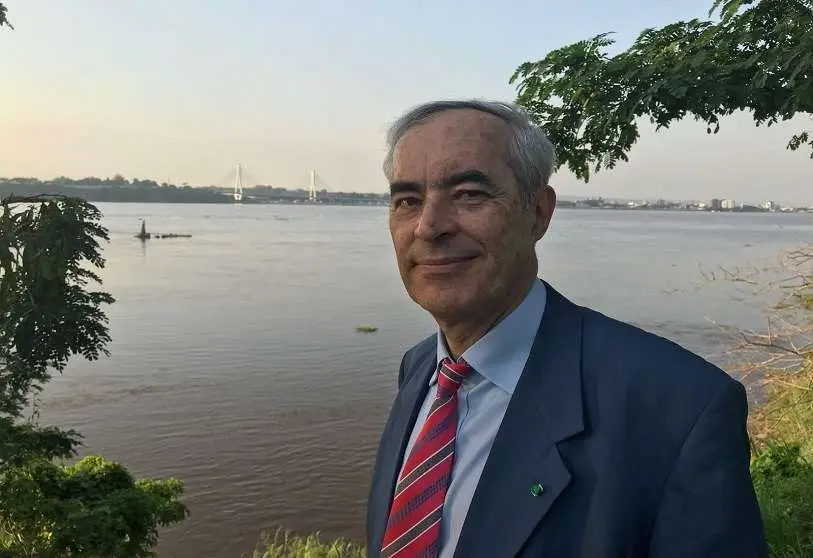Nicolas Normand, former French ambassador to Mali: "It should have been explained that this is a long-term battle and that the military aspect cannot do everything"

Nicolas Normand (Neuilly-sur-Seine, 1959) is an experienced diplomat. Trained at the elite National School of Administration (ENA), a factory for senior officials of the Fifth French Republic, he served as ambassador to Africa, where he was posted in countries such as the Congo, Senegal and Gambia. He knows the continent well. So much so that he writes about it in his work Le grand livre de l'Afrique (Eyrolles Edition, 2018). But perhaps the most important place in his career has been Mali, the heart of the Sahel, where he served as France's top representative at the beginning of the decade and where he had as his 'number two' Joel Meyer, the ambassador to Mali expelled in January by the military junta in the framework of the bilateral crisis with Bamako. Normand explains to Atalayar the causes of failure.
Q: As a former French ambassador to Mali, do you think Paris has mismanaged political relations with the country since the 2013 intervention? If so, what were the most important mistakes that led to the diplomatic rupture with Bamako?
A: Yes, there were a number of political mistakes: the 2013 Serval Operation, later called Barkhane, should not have dragged on for years. This excessive visibility of the army of the former colonial power was necessarily going to be perceived as an army of occupation; it was necessary to make the support almost invisible, in support of the Malian army. Moreover, the Malian authorities should have at least conducted a communication campaign to explain the French military support. Instead, the French army communicated very poorly. It should have been explained that this is a long-term battle and that the military aspect cannot do everything. The role of supporting the Malian army and its rise to power needed to be emphasised. The Malian regime that emerged from the second coup d'état had exploited anti-French discontent. It was important not to react violently to Malian Prime Minister Choguel Maiga's accusations and thus provoke an escalation to the point of dismissing the French ambassador, but without breaking diplomatic relations.
Q: Your successor, Joel Meyer, was recently dismissed by the military junta. Did you have a chance to talk to him? What was the climate in Mali at the height of anti-French sentiment?
A: Joel Meyer was my number two when I was ambassador to Mali. I have not been in touch with him since his dismissal from Bamako, which was only due to inappropriate statements from Paris. The anti-French climate, very clear in Bamako but little present elsewhere, especially in the northern regions that benefited from Barkhane's aid, was amplified by two elements: the repeated anti-French accusations by Mali's prime minister and the virulent Russian-led media campaign on social media, accusing France of looting Mali and actually supporting the jihadists by pretending to fight them, with fake videos.
Q: Has President Macron mismanaged the diplomatic crisis?
A: Yes, President Macron has mismanaged this crisis by adding fuel to the fire, publicly accusing the military junta in Bamako of being illegal, illegitimate, irresponsible... instead of talking calmly with them.
Q: What is your assessment of the withdrawal announced by Macron and, subsequently, the end of the Barkhane operation in Mali forced by the military junta?
A: French military aid to Mali has been suspended for a long time, resulting in a clear deterioration of the security situation, statistically proven, despite the presence of Russian mercenaries from the Wagner group, also accused of indiscriminately killing jihadists and populations suspected of supporting them, albeit unwittingly. But French military aid is being reinforced in Burkina Faso and Niger at the request of the authorities there.

Q: Why did the military junta decide to use Wagner's services?
A: Because the junta is aware that the Malian army is not yet capable [of defeating the Islamist insurgency militarily]. And perhaps also out of defiance of France.
Q: Many analysts say Barkhane has been a failure, do you think so?
A: If Barkhane had been a failure, the jihadists would have taken over several cities in the north and eventually Bamako. Defeat was avoided, but victory is impossible without the Malian authorities acting to occupy and administer the territories liberated from the jihadists, who can then return, and without addressing the causes of the evil: regions and populations abandoned by the authorities in Bamako, young people on the rise without training and with a future blocked in relation to the demographic explosion. In this context, the radicalisation of part of the youth is inevitable.
Q: Who is France's main partner in the region today?
A: France's main partners in the region are Niger, Chad, Burkina Faso, Côte d'Ivoire, Benin and Togo. All these countries ask for and count on French assistance.
Q: In your opinion, what are the causes of the crisis in the Sahel?
A: The main cause is twofold: a) very weak states in terms of armies, police, justice, administration with low tax revenues and services to the population, and b) young people with no training or prospects, due to the poor development of these countries, in a context of a demographic explosion.










